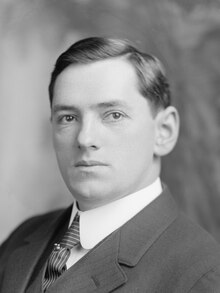
Back جيمس مايكل كيرلي Arabic جيمس مايكل كيرلى ARZ جیمز مایکل کرلی AZB James Michael Curley German James Michael Curley Spanish جیمز مایکل کرلی FA James Michael Curley French Iacobus Michael Curley LA Michael Curley Dutch James Michael Curley Swedish
James Curley | |
|---|---|
 | |
| 53rd Governor of Massachusetts | |
| In office January 3, 1935 – January 7, 1937 | |
| Lieutenant | Joseph L. Hurley |
| Preceded by | Joseph B. Ely |
| Succeeded by | Charles F. Hurley |
| Mayor of Boston | |
| In office January 7, 1946 – January 2, 1950 | |
| Preceded by | John E. Kerrigan (acting) |
| Succeeded by | John Hynes |
| In office January 6, 1930 – January 1, 1934 | |
| Preceded by | Malcolm Nichols |
| Succeeded by | Frederick Mansfield |
| In office February 6, 1922 – January 4, 1926 | |
| Preceded by | Andrew James Peters |
| Succeeded by | Malcolm Nichols |
| In office February 2, 1914 – February 4, 1918 | |
| Preceded by | John F. Fitzgerald |
| Succeeded by | Andrew James Peters |
| Member of the U.S. House of Representatives from Massachusetts | |
| In office January 3, 1943 – January 3, 1947 | |
| Preceded by | Thomas A. Flaherty |
| Succeeded by | John F. Kennedy |
| Constituency | 11th district |
| In office March 4, 1911 – February 4, 1914 | |
| Preceded by | Joseph F. O'Connell |
| Succeeded by | James A. Gallivan |
| Constituency | 10th district (1911–1913) 12th district (1913–1914) |
| 2nd President of the United States Conference of Mayors | |
| In office 1933 | |
| Preceded by | Frank Murphy |
| Succeeded by | T. Semmes Walmsley |
| Acting Chairman of the Boston Board of Aldermen | |
| In office 1909 | |
| Preceded by | Louis M. Clark |
| Succeeded by | Frederick J. Brand |
| Member of the Boston Board of Aldermen | |
| In office 1905–1909 | |
| Member of the Massachusetts House of Representatives from the 4th Suffolk district | |
| In office 1902–1903 | |
| Member of the Boston Common Council | |
| In office 1901 | |
| Personal details | |
| Born | November 20, 1874 Boston, Massachusetts, U.S. |
| Died | November 12, 1958 (aged 83) Boston, Massachusetts, U.S. |
| Political party | Democratic |
| Spouses | Mary Herlihy
(m. 1906; died 1930)Gertrude Casey (m. 1937) |
| Children | 9 children 2 stepsons |
James Michael Curley (November 20, 1874 – November 12, 1958) was an American Democratic politician from Boston, Massachusetts. He served four terms as mayor of Boston between 1914 and 1955. Curley ran for mayor in every election for which he was legally qualified. He was twice convicted of criminal behavior and notably served time in prison during his last term as mayor. He also served a single term as governor of Massachusetts. He is remembered as one of the most colorful figures in Massachusetts politics.
Curley also served two terms, separated by 30 years, in the United States House of Representatives and, in his early career, served in the Boston Common Council, Boston Board of Aldermen, and Massachusetts House of Representatives.
Curley was immensely popular with his fellow working class Roman Catholic Irish Americans. During the Great Depression in the United States, he enlarged Boston City Hospital, expanded the Massachusetts Bay Transportation Authority, funded projects to improve roads and bridges, and improved the neighborhoods with beaches and bathhouses, playgrounds and parks, public schools, and libraries, all the while collecting graft and raising taxes.
He was a leading and at times divisive force in the Massachusetts Democratic Party, challenging Boston's ward bosses and the party's white Anglo-Saxon Protestant leadership at the local and state levels. His political tactics, which tended to drive businesses and economically successful people from the city, damaging the local economy, have become an object of study for economists and political scientists.[1] A 1993 survey of historians, political scientists and urban experts conducted by Melvin G. Holli of the University of Illinois at Chicago ranked Curley as the fourth-worst American big-city mayor to have served between the years 1820 and 1993.[2]
- ^ Cite error: The named reference
Glaeser & Shleiferwas invoked but never defined (see the help page). - ^ Holli, Melvin G. (1999). The American Mayor. University Park: PSU Press. ISBN 0-271-01876-3.